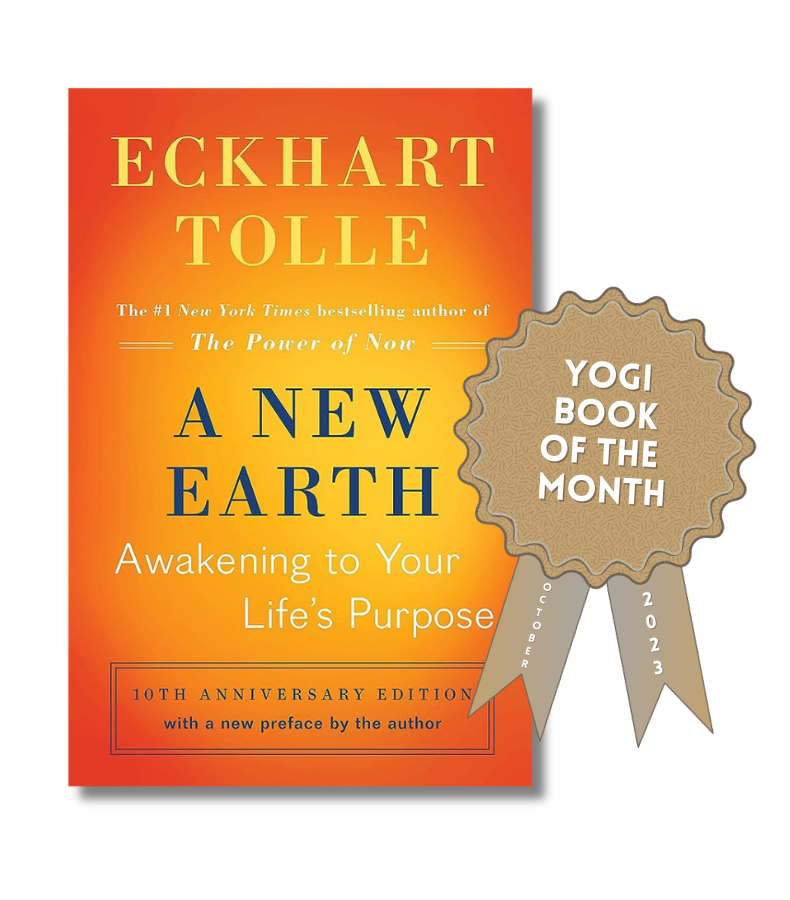Yogi Book of October 2023: A New Earth
“To recognize one's own insanity is, of course, the arising of sanity, the beginning of healing and transcendence.”
Why Yogi Book of the Month?
Yogi Book of the Month was born in the hopes of making Jnana Yoga (the Path of Knowledge) more accessible.
Few of us have the luxury of access to living gurus or the attention span/ability to unpack the dense yogic scriptures on our own. Thankfully, gurus are many, gurus do not have to (necessarily) be alive, and knowledge that leads to sincere contemplation and self-realization can be found in stories and books imbued with profound meanings. Here at 7YGH, we endeavor to present you with various sources of such knowledge on a monthly basis.
To provide some instruction on how to best digest this source of knowledge, you will find a general explanation of Jnana Yoga in Jnana Yoga 101 followed by tips on how to apply Jnana Yoga while you read in How to Read This Book. If you are informed and/or would like to skip to the meat of the book review itself, use the Table of Contents below to navigate to your desired section.
Table of Contents
i. Jnana Yoga 101
ii. How to Read This Book
iii. About This Book
iv. Why You Should Read This Book
v. 7 Quotes That Make You Think
The Path of Knowledge
Traditionally, the path of Jnana Yoga refers to 3 processes. The main goal of these 3 processes is to answer the Big Question: Who Am I? By answering this question, smaller critical questions such as “Why Am I Here?” and “What Do I Do With What I Have Been Given?” are automatically answered.
These 3 processes are as follows:
(1) Sravana, or wholeheartedly (open mind, open heart) listening to yogic scriptures (Sruti) from the mouth of a verifiable source (Guru)
(2) Manana, or constant reflection upon what was heard, application of that which was heard to one’s own life and lived experiences, as well as the integration of that knowledge into daily action
(3) Nididhyasana, otherwise known as the culmination of sravana and manana, is a type of meditative and transcendent awareness that happens spontaneously on its own accord. It is a deep understanding and subsequent embodiment of the Truth gleaned from the process of listening deeply with one’s heart, contemplating, and living the knowledge.
Why Should You Practice Jnana Yoga?
The systematic processes of Jnana Yoga should be undertaken frequently to nurture the soul, put things in perspective, and loosen the bonds of strong attachments. Jnana Yoga directly nourishes our inner world by teaching us the skill of maintaining distance, of separating the “I am” from what follows. At its subtlest levels, the practice of Jnana Yoga allows us to mold reality with our right perception.
By regularly analyzing the nature of life, existence and the identity of the “I am” through the practice of Jnana Yoga, we are able to maintain peace of mind and more quickly come back to a place of balance during emotional upheaval, crisis, and the inevitable stresses of the world.
In its early stages, the practice helps us build endurance to the pain of opposites—heat, cold, love, loss, thirst, hunger, desire, repulsion, etc.
In later stages, the practice culminates in a transcendence of the pain of opposites, a state wherein we are able to truly bear witness to our bodies and minds, as well as the bodies and minds of others, without attachment or judgment. In so doing, Jnana Yoga allows us to live our lives to the utmost; by helping us understand the true nature of reality, Jnana Yoga results in the loss of attachments, and in the loss of attachments we are relieved of expectations. Freed of the bondage of expectations, we can truly and fully enjoy the world.
Treat this book as you would a more traditional transmission of knowledge (i.e. a living Guru or Teacher). Treat the book with reverence and respect; this is the first step to taking the knowledge contained within seriously, and the most important step to opening up your heart to receive and understand this knowledge.
If you aren’t open to learning, if you aren’t striving for betterment, and if you aren’t willing to be wrong (!), even the highest knowledge won’t be effective/can’t help you. Half the work of self-realization comes from effort on our parts to retain open minds and open hearts with a complete awareness of our nature’s tendency to do the opposite (to judge, close off, guard). The goal is not to stop these processes of judgment, etc., but to always be aware of them and to persevere to push past them when they flare up.
Do not rush through the book as you would a piece of purely sensual entertainment; savor the passages for their poetic and philosophical values. The point is not to drown yourself but to submerge yourself (!); you are not escaping nor chasing but running towards (!).
Take time after each reading to ponder implied meanings, reflecting on how lessons of characters/narrators/etc. can be applied to your own life—past and present. Try journaling, creating lists of lessons learned, and writing down those lessons on stick notes that you place in conspicuous places (e.g. on your bathroom mirror or kitchen fridge). And, most importantly, start applying the lessons you learn, becoming a living embodiment of the knowledge you are gaining.
Title
A New Earth: Awakening to Your Life's Purpose
Author
Eckhart Tolle
Genre
Spirituality, psychology, self-help
Language
English
Length
309 pages
Publisher
Plume, a member of Penguin Group (USA)
Summary
💡 A field manual for managing the ego and nurturing inner awareness, Eckhart Tolle’s A New Earth offers a map to awakening with powerful insights into how to overcome what’s holding us back, unlock our full potential, and find our life’s purpose.
Dissects the mechanics of the false self known as the ego. This book tells you what the ego is, how to recognize it, and how to manage it. It’s the guide we never knew we needed to breaking away from the habit of identification with thoughts and the incessant need for more.
A manual for awakening — and how to get there. Awakening, enlightenment, awareness, higher consciousness, these are all words used interchangeably by the growing spiritual communities of the world. Every community has its own definition and often these definitions feel incomplete, beyond comprehension, and impossible to attain in this lifetime. Thankfully for us, Tolle has come along with A New Earth, which offers an interesting interpretation of what it means to not only awaken but to stay awake in the material world. In a world where many spiritual traditions advocate for a hard line between the material and the spiritual, this is a critical and necessary addition to the conversation around how to stay conscious and be in the world without renouncing the world.
Dense with spiritual wisdom and possessing a high readability factor. This is a book that you could reread every year for the rest of your life. You could read it in one sitting; you could read one page every day for 309 days of the year; you could read a chapter a week. Whatever pace you choose, the book will do something miraculous through the simple act of you reading it; it will bolster your awareness. Every time you reread the book, you will notice new insights and that awareness will grow.
Advice for how to behave in the world and methods for how to cultivate the right attitude. This book is a karma yogi’s dream. Its dissection of the ego isn’t theoretical; by giving us the tools to not only witness but work with the ego, A New Earth acts like an advice column that never stops giving.
A guide to the pain-body: what it is, how others react to it, and how to work with it. As we live, we tend to acquire baggage. This baggage can feel like dragging rocks around the neck. In short, this is the emotional pain you’ve acquired throughout life and didn’t deal with in the moment. Another word for this baggage is the pain-body. An understanding of the pain-body spurs an understanding of a lot of things that don’t make sense in life—like why you’re attracted to this or repulsed by that, why people react to you a certain way, and so on.
Clarity, simplicity, and applicability of teachings. The first time I read A New Earth, a lot of things from other more dense or complex spiritual texts finally clicked into place. I feel that much of this book’s dialogue on consciousness, the ego, and how to awaken is Advaita Vedanta in plain-speak. As such, this book feels like a prerequisite (or companion?) to the study of more traditional teachings; it can shed light on concepts like a Universal Self, selfless action, etc. in a way that’s not only comprehensible but actionable in daily life.
Teachings that meet you where you’re at. The beauty of A New Earth rests in the fact that the path outlined by the book doesn’t ask you to give up where you’re at. This makes the teachings very accessible. It generates a sort of peace and contentment regardless of your circumstances in life. This is a great book to read if you feel lost, depressed, or lacking clarity. It won’t fix things and it won’t offer any solutions, not in the way you’re probably thinking it will. It will ultimately offer the only solution that works—a shift in perspective—and it will offer it by showing you how to get there.
“Life is the dancer and you are the dance.”
“Living up to an image that you have of yourself or that other people have of you is inauthentic living.”
“Awareness is the greatest agent for change.”
“Don't Seek Happiness. If you seek it, you won't find it, because seeking is the antithesis of happiness.”
“When you don't cover up the world with words and labels, a sense of the miraculous returns to your life that was lost a long time ago when humanity, instead of using thought, became possessed by thought.”
“Give up defining yourself - to yourself or to others. You won't die. You will come to life. And don't be concerned with how others define you. When they define you, they are limiting themselves, so it's their problem. Whenever you interact with people, don't be there primarily as a function or a role, but as the field of conscious Presence. You can only lose something that you have, but you cannot lose something that you are.”
“One thing we do know: Life will give you whatever experience is most helpful for the evolution of your consciousness. How do you know this is the experience you need? Because this is the experience you are having at this moment.”

